Autoimmune Hepatitis
What is autoimmune hepatitis?
Autoimmune immune hepatitis is an infection of the liver. It is characterized by an "immune attack" of the liver's components and cells. This attacks results in inflammation and damage to the liver. The immune system is responsible for protection from pathogens and other harmful foreign substances.
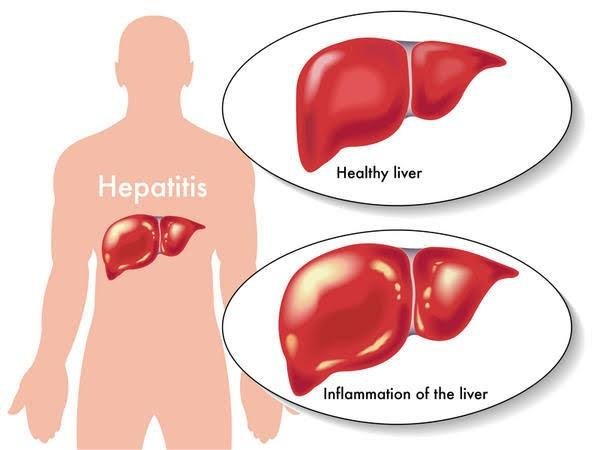
Image Source: Google
Autoimmune hepatitis gets worsened if not treated on time. It could lead to liver failure and cirrhosis. Cirrhosis occurs when the healthy tissues of the liver is replaced by scars - this blocks hepatic circulation (the flow of blood through the liver). Liver failure occurs when the liver does not function at physiological capacity.
About autoimmune diseases
Autoimmune diseases are diseases which arise as a result of the body being attacked by its own immune system. The attack is carried out by proteins known as autoantibodies; a process known as autoimmunity.
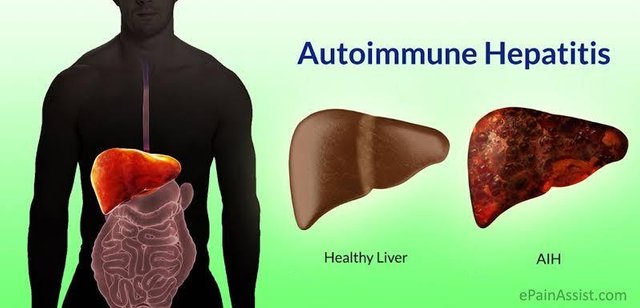
Image Source: Google
Our immune system produces antibodies on daily basis to help combat infections. However, sometimes, the immune system could produce autoantibodies. Autoimmunity is triggered by a number of environmental factors including toxins, medications, bacteria and viruses.
What Causes autoimmune hepatitis?
Autoimmune hepatitis can be caused by a combination of three factors namely;
-Autoimmunity
-Genetics
Who is at the risk of developing hepatitis?
This disorder is more common in females.
However, men are also at risk. There is no age restriction and all ethnic groups are affected.
Types of Autoimmune Hepatitis
There are two classes of autoimmune hepatitis-Type 1 and Type 2.
Type 1 autoimmune is very common in North America. People of all ages are affected; however, it starts mostly at adolescence or young adulthood. Females make up 70 percent of patients of Type 1 autoimmune hepatitis.
Patients of Type 1 autoimmune hepatitis are usually affected with other autoimmune disorders.
Such disorders include;
Celiac disease: Here, the patients have very low tolerance to gluten because it causes much damage to the lining of the small intestines and inhibiting the absorption of nutrients.
Crohn's disease: This is characterized by an inflammation and irritation of the gastrointestinal tract.
Graves' disease: In the United States, Graves' disease is commonly associated with hyperthyroidism.
Hashimoto's disease: Another name for this is chronic lymphocytic thyroiditis. It is also known clinically as autoimmune thyroiditis. It is the chronic inflammation of the thyroid gland.
Proliferative glomerulonephritis: It is the inflammation of the glomeruli. The glomeruli are small, looped vascular tissues in the kidney.
Primary Sclerosing cholangitis: This is associated with scarring, irritation and reduction in the size of lumen of the bile ducts within and without the liver.
*Type 2 autoimmune hepatitis* is not as common as Type 1. Notwithstanding, what should be known is that it occurs more commonly in **children** than it does in adults. The autoimmune disorders listed above can also occur alongside Type 2 autoimmune hepatitis.
Symptoms
Symptoms most commonly associated with autoimmune hepatitis include:
- Rashes on the skin
- Pains in the joint
- Fatigue
- Nausea
- Urine with a dark yellow color
- Light-colored stools
- Yellowing of the whites of the eyes and skin - a condition referred to as Jaundice.

Image source: Google
These symptoms could be mild or severe. Some patients may think they've got a mild case of flu. Others may not exhibit the symptoms, even after diagnoses of the disease. However, the symptoms does show up later.
Diagnosis
Diagnosis will be made by your healthcare provider based on results obtained from a liver biopsy, symptoms, blood tests and a physical exam.
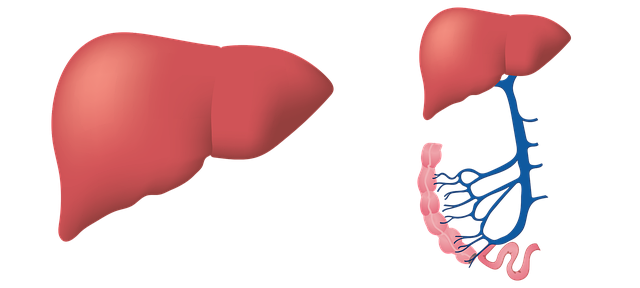
Image Source: pixabay.com
Your healthcare provider will review your medical history and also carry out a physical examination on you. Your alcohol use and medications will also be checked (note that some medications have the potential to damage the liver, e.g acetaminophen).
Blood tests is usually required for an accurate diagnosis because autoimmune disorders and autoimmune hepatitis do share similar symptoms.
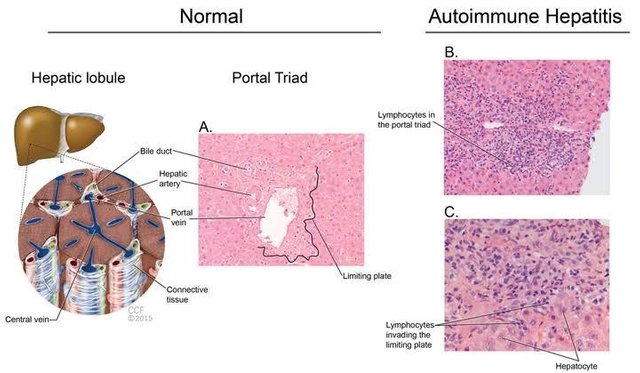
Image source: Google
A liver biopsy involves extracting a piece of your liver tissue and analyzing it under a microscope for signs of damage. You may be required to stop taking some medications prior to the biopsy. You will also be asked to fast at least 8 hours before the biopsy takes place.
Treatment
Treatment for autoimmune diseases and hepatitis (autoimmune hepatitis) is aimed at suppressing the overactive immune system. A liver transplant may also be required in extreme cases.
Treatment is more effective if the disorder is diagnosed early. People with autoimmune hepatitis usually respond positively to standard treatments. A prolonged response can reverse some damage that has been done to the liver.
Medications Used Include:
Corticosteroids: Corticosteroids acts to reduce swelling and also suppress the activity of the immune system. A daily dose of prednisone can treat both types of autoimmune hepatitis. At the initial stage, dosage may be high, but as the condition improves, the dosage administered is lowered. The aim of treatment is to find the lowest dose that can effectively control the condition.
Prednisone has attendant side effects which include:
- Weight gain
- Acne
- Diabetes
- Hypertension
- Thinning of the skin and hair
- Anxiety and confusion
- Glaucoma and cataracts
Immune System Suppressors: There are medications that inhibits the activities of the immune system. By so doing, the production of autoantibodies is suppressed, thus creating a barrier to the immune reaction that enhances inflammation. Physicians make use of azathioprine alongside prednisone to treat hepatitis and autoimmune diseases. However, use of azathioprine alongside prednisone does have some side effects. Why?
Because the dose of prednisone is lowered when combined with azathioprine.
Such effects include:
- Nausea
- Vomiting
- Damage to liver
- Inflammation of the pancreas
- Low white blood cell count
Because azathioprine suppresses the immune system, it is essential that patients go for regular blood cell count, as the white blood cell count could be lowered beyond normal. If the side effects are severe, then there may be need to discontinue with the therapy.
Liver Transplant: This is another remedy for autoimmune diseases and hepatitis. This is necessary when the disorder has progressed to end-stage liver failure and cirrhosis. During liver transplant, the diseased liver is removed and replaced with a healthy one. The healthy liver is obtained from a donor.
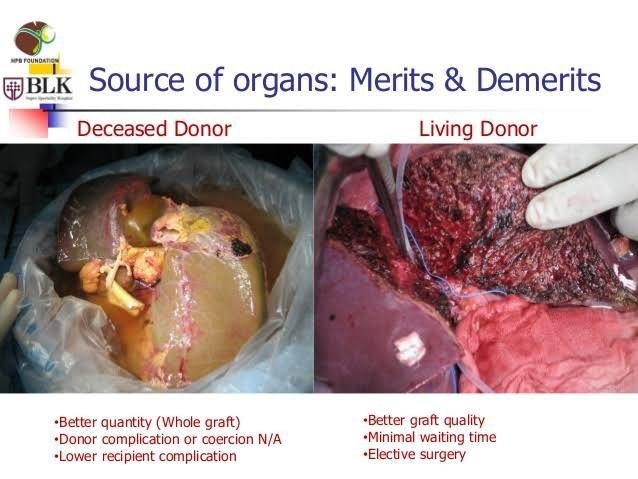
Image Source: Google
Liver failure and autoimmune hepatitis share similar symptoms including:
- Easy bruising of the skin
- Swollen ankles or stomach
- Generalized itching
- Bloating of the abdomen due to the enlargement of the liver.
- Ascites
It should be noted that patients of autoimmune diseases and hepatitis usually respond to treatment and in most cases, the disorder can be controlled.
References
Manns MP, Czaja AJ, Gorham JD, et al. Diagnosis and management of autoimmune hepatitis.
Hepatology. 2010; 51(5): 1-31.

Thank you for reading
Very educating piece sir
Thank you
Great Exposition!
Thank you
This is serious. There are too many health challenges associated with the liver. Why is it so?
This is @desmonddesk
Yeah @desmonddesk, the liver is always exposed to so many risk factors such as alcohol abuse, drugs, autoimmune diseases, iron overload etc.
Though the liver plays a very vital role in the body in terms of metabolism, protein production and others, once it's exposed to these risk factors, its optimum functionality could be jeopardized and a disease develops.
Good one. Is there a vaccine for this though?
Yes, there is. Example is Hepatitis A Vaccine (HAV), which contains viral antigens useful in the vaccination of autoimmune hepatitis.
Your sources especially for images are not specific. Next time you could add a link to the image. But this post is highly informative
Thank you very much, I've noted this. Though sometimes I find difficulty trying to copy the link successfully, but I'll do well to get it perfect next time.
Thank you for your kind words.
Careful attention to details. And in simple terms for people like me who are not go the medical line to understand. @joshuaetim, this was very informative. I'll have to bookmark this page on my browser for future reference. Cheers
Thank you very much, I'm glad you found this valuable.
Nice one
This is powerful.. Thanks for sharing this
If only i could copy this and send to a friend so he could see how alcohol abuse can damage his liver. Thanks josh 4 this great piece. :)
Congratulations! This post has been upvoted from the communal account, @minnowsupport, by joshuaetim from the Minnow Support Project. It's a witness project run by aggroed, ausbitbank, teamsteem, theprophet0, someguy123, neoxian, followbtcnews, and netuoso. The goal is to help Steemit grow by supporting Minnows. Please find us at the Peace, Abundance, and Liberty Network (PALnet) Discord Channel. It's a completely public and open space to all members of the Steemit community who voluntarily choose to be there.
If you would like to delegate to the Minnow Support Project you can do so by clicking on the following links: 50SP, 100SP, 250SP, 500SP, 1000SP, 5000SP.
Be sure to leave at least 50SP undelegated on your account.